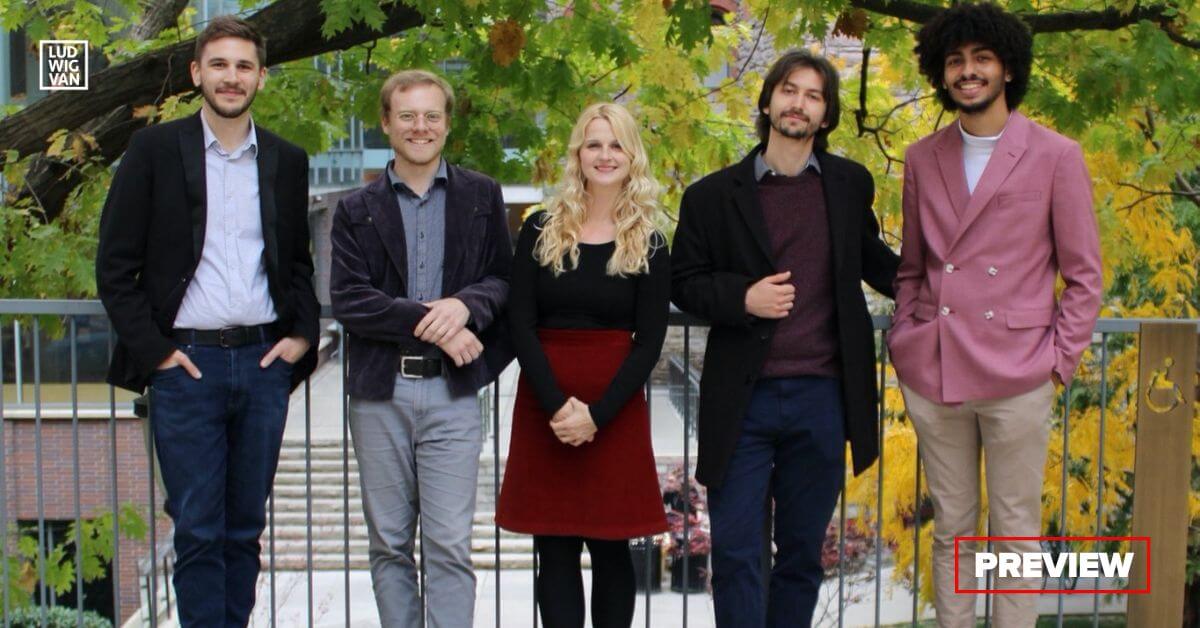
Apocryphonia’s raison d’être is to reveal the beauty of neglected composers and their works. Their next event, Strozz-ulana! on May 27, spotlights the vocal works of composers Barbara Strozzi and Maddalena Casulana. The Diapente Renaissance Vocal Quintet will perform a selection of madrigals by both Italian composers.
Both were women whose desire for a musical career and presence in society defied the conventions of the era.
Barbara Strozzi
“I reverently consecrate this first work, which I, as a woman, all too ardently send forth into the light, to the august name of Your Highness, so that under your Oak of Gold it may rest secure from the lightening bolts of slander prepared for it.” (Barbara Strozzi in her dedication to Opus 1, to Vittoria della Rovere, duchess of Tuscany)
Barbara Strozzi was born in Venice in 1619. Her parentage is not documented; however, it is believed that her father was Giulio Strozzi, a well known poet and librettist. He was a member of the influential Accademia degli Incogniti. Her mother, it is speculated, may have been a servant. Barbara and her mother lived with Giulio, and were recognized in his will. Throughout her childhood, Venice was decimated by a series of plagues, but Barbara received an education, including music.
She began to display vocal talent by the age of 12, and added the lute to her musical practice. Giulio arranged for her to take lessons in composition with Francesco Cavalli. By age 15, her singing talent was described as virtuosic.
Barbara took her father’s last name at the age of 18 in 1637, and never married, although it is believed she may have lived as a mistress of Giovanni Paolo Vidman, a Venetian nobleman, and had three children with him. There is some doubt as to whether the relationship was entirely consensual.
As a composer of vocal music, she produced eight volumes of work, (largely cantatas and arias), and was said to be the most prolific composer of secular songs of her day. She often used texts by the Marino, one of the most popular poets of the day.
Maddalena Casulana
“…these first fruits of mine, flawed as they are…show the world the futile error of men who believe themselves patrons of the high gifts of intellect, which according to them cannot also be held in the same way by women…” (Maddelena Casulana, from the dedication in her first book of madrigals in 1566)
While Strozzi’s work falls clearly into the early Baroque, Maddalena Casulana, born in 1544, was a composer of the late Renaissance. Not much is known about her life. It is believed Maddalena was born near Siena, Italy, and was educated in Florence, where she published her first book of four madrigals in 1566.
She is the first woman composer to have published an entire book of her own music, which she dedicated to a woman, her patron Isabella de’Medici.
Her music was also published in Verona, Milan and Venice, where there are several written accounts of her musical gifts. She was also known to have visited the French Imperial court in the 1570s. Some time during the 1570s or 1580s, she married a man by the name of Mezari.
She leaves a trove of madrigals written in a somewhat contrapuntal and chromatic style, 66 of which survive to the present. In an exciting development, the lost alto partbook of her 1583 book of madrigals in five voices, along with another 17 madrigals, was rediscovered in 2022.
The Performers
The concert will be performed by the Diapente Renaissance Vocal Quintet, founded by tenor Alexander Cappellazzo (also responsible for Apocyrphonia the organization). The quintet was founded in 2022 to explore the works of the 15th, 16th, and 17th centuries, with an informed sense of their history and technique.
The quintet consists of Peter Koniers (countertenor), Jonathan Stuchbery (tenor & lutenist), Jane Fingler (soprano), Alexander Cappellazzo (tenor), and Martin Gomes (bass).
- Find more information about the May 27 concert, and tickets, [HERE].
Are you looking to promote an event? Have a news tip? Need to know the best events happening this weekend? Send us a note.
#LUDWIGVAN
Get the daily arts news straight to your inbox.
Sign up for the Ludwig Van Toronto e-Blast! — local classical music and opera news straight to your inbox HERE.
- PREVIEW | Upper Canada Choristers Celebrate 30th Anniversary With World Premieres, New Beginnings - May 3, 2024
- THE SCOOP | Could The Kitchener Waterloo Symphony Be On The Road To Renewal? - May 3, 2024
- PREVIEW | The Orpheus Choir Of Toronto Ends The Season With Jocelyn Hagen’s The Notebooks Of Leonardo Da Vinci - May 2, 2024



